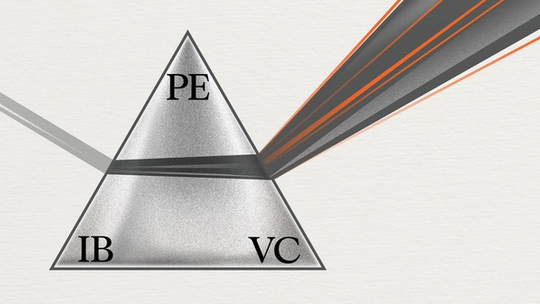The Investor Skills Spectrum: What It Takes


Private equity, venture capital and investment banking require specialized skills and offer exciting career opportunities for aspiring investors. This guide breaks down the roles, skills, and career progression in each sector, helping those aiming to break into investing choose the right path.
- Private equity focuses on transforming companies through hands-on management; investment banking is driven by fast-paced deal-making, and venture capital nurtures early-stage innovation with higher risk.
Private equity (PE), venture capital (VC), and investment banking (IB) offer exciting career opportunities, but each field requires a unique skill set and approach. Understanding the differences between these sectors is an important starting point for anyone considering a career in finance. While all three focus on creating value and generating returns, their methods, timelines, and the skills needed to succeed vary.
This article explores the differences between PE, IB, and VC, breaking down the roles of investors in each field. It also looks at the skills needed to get ahead, potential career trajectories, and the major distinctions in how each sector approaches investing.
Whether you're looking to land a hands-on role in transforming companies, execute high-stakes deals, or back the next generation of startups, this guide will help you get to grips with the different paths in the world of investing.
What do these different investors do?
Investors in PE, IB, and VC take different approaches to creating value and generating returns, making it important for aspiring investors to understand what sets them apart.
Private equity investors
PE investors usually focus on making majority investments in, or entirely acquiring established companies, actively upgrading their operations, and driving strategic growth (although occasionally, PE firms make minority investments with less direct involvement). Ultimately, their goal is to sell or take the company public for a profit. Before that, their day-to-day activities usually center on achieving long-term value through hands-on management and operational improvements. Naturally, this takes time, often over a five to seven year investment period. Success is measured by the profitability and growth of portfolio companies, and the returns PE investors generate, if any, for their Limited Partners after a sale or public offering.
Investment bankers
Investment bankers facilitate mergers, acquisitions, and raising capital. Their role is more transactional than operational: they focus on structuring deals, evaluating risks, and advising companies on maximizing value. Unlike PE, IB professionals aim to complete deals quickly, working on multiple transactions at a time. Success is defined by deal execution and client satisfaction.
VC investors
VC investors back early-stage startups with high growth potential. They take minority stakes and support founders, typically advising on business strategy and scaling. VC investments are riskier, but they can offer significant returns if the startup succeeds, with exits typically occurring through IPOs or acquisitions after seven to 10 years.
Key skills for investors
Professionals in PE, IB, and VC may take different approaches to investing, but they all have skills in common. Here is an outline of some of the essential skills in the investor spectrum, with a focus on teasing out how they are used differently in each field.
Financial modeling and valuation
For PE and IB professionals, financial modeling is essential for valuing mature companies and assessing their cash flows. PE investors use these skills to generate long-term projections and model exit scenarios – all to help inform acquisitions and manage portfolio companies. On the other hand, IB professionals use modeling to support mergers and acquisitions (M&A), focusing on how a deal should be structured and identifying any risks that could affect the transaction. For VC investors, modeling is more speculative, as they forecast potential growth and capital needs for early-stage startups that often have very limited financial history.
Deal-making and negotiation
Deal-making sits at the heart of all three roles, but the focus varies in each. IB professionals act as the intermediaries in fast-paced M&A deals – in 2023, for example, over 55,200 were reported globally. In contrast, PE investors do fewer deals because they are in it for the long haul, on board for the entire lifecycle of a deal – from acquisition through to exit. In 2023, 12,000 were reported globally. For VCs, it can be a more personal engagement, as they work closely with founders to structure deals that support the company’s growth while also negotiating their own equity stakes and rights to participate in future funding rounds.
Due diligence and risk management
To generate returns, investors have to make informed investment decisions. Due diligence, the thorough investigation of a potential investment or transaction to assess the surrounding opportunities and risks, provides this essential insight. For PE and IB professionals, due diligence is a lengthy and rigorous process that can take anywhere from 6-12 months, involving the analysis of financials, market trends, and legal frameworks to minimize risk. For VC investors, due diligence focuses primarily on the founding team, the market potential, and the business’s scalability. VCs accept higher levels of risk due to the early-stage nature of startups, with research suggesting investors spend an average of 118 hours on due diligence before a deal closes.
Emotional intelligence and communication
The so-called ‘soft skills’ are becoming increasingly important across all areas of the economy, and their role in investing has long been a subject of research. Emotional intelligence (EQ) is crucial for building relationships, whether with startup founders, portfolio company executives, or investment banking clients. Effective communication and conflict resolution skills are critical for all investors because they are a fundamental part of negotiation. While IB professionals may rely on communication to manage client expectations and negotiate deals, PE and VC investors use these skills to build long-term partnerships and offer strategic guidance.
Unique skills by field
While there is some overlap in the skill sets required across PE, IB, and VC, each area of investing also calls for unique skills that are tailored to its core activities. Below are just some of the specialized skills that set these fields apart.
Operational expertise and value creation (PE)
In PE, investors often take an active role in transforming companies after they invest in or acquire them. This includes improving operations, optimizing cash flow, and developing strategies to increase long-term value. Although recent performance has been somewhat sluggish, between 2010 and 2020, PE delivered annualized returns of 10.5%. Direct experience in business operations, whether gained in consulting or in-house at a corporate prior to a role in PE, has been instrumental in investors’ ability to identify value-creation opportunities and execute strategies that can potentially lead to profitable exits.
Transactional expertise and capital markets knowledge (IB)
IB professionals specialize in executing high-stakes deals, such as mergers, acquisitions, and IPOs. The stakes are higher because the sums involved are often larger: deal sizes for large-cap M&A transactions facilitated by investment banks often exceed $1 billion. IB professionals’ expertise in capital markets allows them to structure complex transactions quickly. In IB, the ability to navigate regulatory frameworks, coordinate with stakeholders, and deliver under pressure is critical, as deals often involve tight deadlines and multiple parties.
Identifying innovation and early-stage risk management (VC)
VC investors focus on identifying and backing high-potential startups. Unlike PE or IB, VC deals involve early-stage companies with little financial history. VC professionals must evaluate scalability, tolerate risk (up to 7.5 out of 10 VC-backed startups fail), and understand emerging markets. They also sometimes provide mentorship, so building strong relationships and offering strategic guidance to founders is essential.
Career trajectories
Career paths in PE, IB, and VC follow different timelines and structures, with distinct opportunities for progression. Below is a streamlined comparison that highlights the key differences:
Private equity
- Career path type: PE firms typically follow a tiered structure, starting with analyst or associate roles, followed by vice president, principal, and partner positions.
- Organizational structure: Smaller deal teams in PE mean early exposure to senior management and hands-on involvement in portfolio companies.
- Time to mid-level position: 3-4+ years, depending on prior experience, with MBAs often joining directly at mid-level roles.
- Time to senior position: Approximately 7-10+ years to reach principal or partner, though this depends on deal success and value creation at the portfolio level.
- Essence of the role: The role is deeply operational, requiring experience in improving company performance through strategic and operational changes.
Investment banking
- Career path type: Traditional hierarchy with positions ranging from analyst to associate, vice president, director, and managing director.
- Organizational structure: Larger teams and a more transactional environment, with a focus on deal structuring and execution.
- Time to mid-level position: Typically 3-5+ years from analyst to associate, with an MBA commonly required for promotion to vice president.
- Time to senior position: 10-12+ years, with progression highly dependent on deal-making success and revenue generation.
- Essence of the role: The role is transactional and focused on closing high-value M&A deals, with a fast-paced work environment.
Venture capital
- Career path type: Follows a flatter path compared to IB and PE, with roles including associate, principal, and partner.
- Organizational structure: Typically smaller teams, with close interaction with entrepreneurs and start-ups.
- Time to mid-level position: 4-6+ years, often quicker for those with prior startup or tech experience.
- Time to senior position: Around 8-12+ years to partner, though successful exits can fast-track careers.
- Essence of the role: Emphasis on early-stage investment, where identifying innovation and mentoring founders is critical.
Cross-over potential
While each sector has its own trajectory, professionals sometimes transition between them. PE and IB often have more crossover, as both involve extensive financial analysis and deal-making, though PE’s longer-term focus on value creation differs from IB’s transaction-centered approach. VC, with its emphasis on startups and emerging markets, tends to attract individuals with entrepreneurial experience but may appeal to those from IB or PE who seek exposure to early-stage investments.
Developing investor skills: building a foundation for success
Aspiring investors in PE, IB, and VC must develop a mix of technical and practical skills to get ahead. Education offers a base, but hands-on experience and continuous learning are essential for mastering the specifics of each field.
Formal education and certifications
Most investors begin with a degree in finance, economics, or business. Advanced qualifications like an MBA or CFA can add value, especially in PE and IB, where expertise in financial modeling, valuation, and capital markets is vital.
On-the-job learning and mentorship
Hands-on experience through entry-level roles is necessary for building deal-making, financial analysis, and client management skills. Mentorship allows junior professionals to learn from seasoned investors. Mentorship programs are quite common at large organizations, including investment banks, but many choose to seek out a mentor they click with independently.
Developing industry-specific expertise
PE requires operational expertise, while VC focuses on emerging technologies and market trends. Building knowledge through industry events, networking, and reports is key.
Charting a successful career path
Mastering the right skill set is important for anyone aiming for a career in private equity, investment banking, or venture capital. Each sector offers distinct paths, but they all require a blend of financial expertise, strategic insight, and strong interpersonal skills. Understanding the commonalities and differences can help you better navigate your career options and sync your skill-building with your professional goals.
ThinQ by EQT: A publication where private markets meet open minds. Join the conversation – [email protected]




